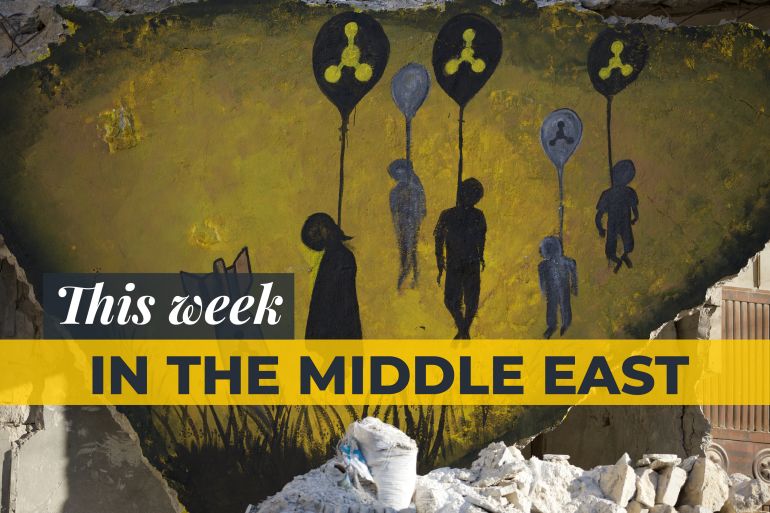Middle East roundup: The enduring horror of the Ghouta chemical attack
Ten years have passed since the Syrian regime attack killed hundreds of people – here’s the Middle East this week.

Ten years since Syria’s regime killed hundreds in a chemical attack | Tunisia’s faltering human rights | New faces in BRICS | The women shaking the region’s music scene. Here’s the Middle East this week:
No justice for Ghouta
“I can’t forget the gasps of suffocating children, the foaming mouths, the terror in their eyes. … The hospital floor was full of dead bodies,” Umm Yahya said at a memorial for the victims of the Ghouta chemical attack.
Keep reading
list of 3 itemsEgyptian opposition activist transferred to prison to await trial
Ben-Gvir says Israeli rights trump Palestinian freedom of movement
Ten years after the Syrian regime attacked towns outside Damascus with a nerve agent, Umm Yahya, a nurse in Ghouta in 2013, relived that day when 1,127 people died and another 6,000 nearly choked to death.
They never got justice. In fact, author and Professor Samer Abboud argues, Arab efforts to normalise relations with Syria undermine Ghouta victims seeking restitution.
Maybe the people will hold Bashar al-Assad’s government accountable – for something else. This week, rare protests erupted in Sweida as people decried deteriorating living conditions.
Tunisia’s police brutality, gender inequality
Human rights aren’t improving in Tunisia.
Police violence is growing as President Kais Saied entrenches his power, using security forces for support when no political parties will back him.
Inheritance is still a sore point in the North African country after it was excluded from women’s rights reforms. Current laws give male heirs twice as much as female heirs, and it doesn’t look like Saied will change that.
BRICS to expand
BRICS – the bloc of large emerging economies consisting of Brazil, Russia, India, China and South Africa – has decided to expand, asking Egypt, Iran, Saudi Arabia and the United Arab Emirates to join along with Argentina and Ethiopia.
Violence a daily reality for Palestinians
Mustafa al-Kastoni, 32, was gunned down in an Israeli raid in Jenin in the occupied West Bank. His mother said he was unarmed and had told Israeli soldiers he would surrender, but dogs were set on him and he was shot.
In occupied East Jerusalem, Israeli forces branded a Palestinian man’s cheek with the Star of David after detaining and beating him.
Israeli society is also unhappy over the far-right government’s changes to the judiciary. Could this lead to Israelis protesting against the occupation and bringing about its end?
And now something different
Syria’s Takht ensemble and Morocco’s Chefchaouen Hadra Sufi band are making waves. Here’s how these female musicians balance rehearsing, performing, motherhood and family reactions to their careers.
Briefly
- To beat the heat in northwest Syria, people head for the water
- Behind Mohammed VI’s push for a more Amazigh Morocco
- Sudanese who fled war now pray for a boat to Europe
- X Blue users will need to send selfie, data to Israeli software company
Quote of the Week
“Those families who were killed by the chemical weapon had a merciful death compared with those who were killed by the warplanes. … There were amputated limbs and blood everywhere.” | Umm Yahya, who witnessed the 2013 chemical attacks on Ghouta